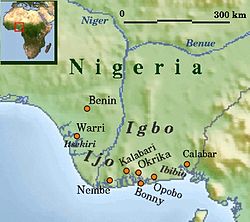Bassambiri
| Nembe Kingdom | |
|---|---|
| traditional state | |
 Ijaw States, including Nembe |
|
| Coordinates: 4°32′N 6°25′E / 4.533°N 6.417°ECoordinates: 4°32′N 6°25′E / 4.533°N 6.417°E | |
| Country |
|
| State | Bayelsa State |
The Nembe Kingdom is a traditional state in Niger Delta. It includes the Nembe and Brass Local Government Areas of Bayelsa State, Nigeria. The traditional rulers take the title "Amanyanabo". Today, leadership is split between the Amanyanabos of Ogbolomabiri, Bassambiri and Twon Brass.
The Nembe are an Ijaw people of the Niger Delta region, settled in the region that now includes the Edumanom Forest Reserve. The date of foundation of the old Nembe kingdom is unknown. Tradition says that the tenth king was called Ogio, ruling around 1639, the ancestor of all subsequent kings. A civil war later split the city into two factions. At the start of the 19th century, king Ogbodo and his followers moved to a new settlement at Bassimibiri, while king Mingi remained at Nembe city.
With the arrival of Europeans on the coast, the Nembe kingdom became a trading state, but was relatively poor compared to Bonny and Calabar. European traders knew the area as "Brass" based on the people's use of the phrase "ba ra sin" when trading, meaning "I don't accept that deal", and at first used "Brasstown" to refer to the inland city of Nembe. Later they used "Brass" to refer to the coastal town of Twon, now known as Twon-Brass.
The Nembe slave trade picked up in the second quarter of the 19th century when the British attempted to suppress slavery by blockading the ports of Bonny and Calabar. The position of Nembe town 30 miles up the Brass River became an advantage in these circumstances. However, with dwindling demand for slaves, by 1856 the palm-oil trade had become more important and trade had moved to Twon/Brass on the coast. In the later 19th century, Christian missionaries contributed to the existing factional tensions among the Nembe. Ogbolomabiri acquired a mission in 1867, while Bassambiri remained "heathen".
After 1884, the Nembe kingdom was included in the area over which the British claimed sovereignty as the Oil Rivers Protectorate. The Nembe, who by now controlled the palm oil trade, at first refused to sign a treaty, and fought to prevent the Royal Niger Company obtaining a trade monopoly. In January 1895 the Nembe King William Koko led a dawn attack of more than a thousand warriors on the company's headquarters at Akassa, with no European casualties. This triggered a retaliatory raid in which the British destroyed the town of Brass and slaughtered four thousand Nembe. Many more Nembe died from an outbreak of smallpox. The British later established a consulate in Twon-Brass, from where they administered the area. Traditional rulers were reinstalled in the 1920s, but with an essentially symbolic role which they retain today.
...
Wikipedia
